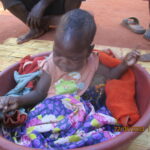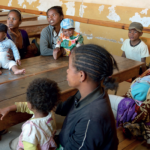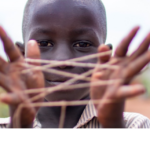Is the intervention essential? Will the children deteriorate without the input?
Young children with developmental disabilities particularly severe disabilities are at risk of deterioration without ongoing input and support. Those particularly at risk would be those with malnutrition and feeding difficulties, in times of lockdown malnutrition may increase due to financial difficulties. We know that half of the deaths of children under 5 years are associated with under nutrition. Children with severe disabilities also have difficulties with positioning and are therefore at high risk of deformities and pressure sores, further impacting on their health and wellbeing.
The benefit of ongoing intervention for these children is that their wellbeing, feeding and positioning can be reviewed and adapted in each session. The groups provide peer support that improves the mother’s emotional wellbeing which is essential for the wellbeing of her family.
Are the children in the group medically at risk? Would they be high risk for severe illness if exposed to COVID19?
If so, how do we manage this? Are the precautions detailed below considered enough by your team?
Or do they need shielding? If so discuss with the parents as to whether this is possible within their family.
Suggestions for safe groups:
- Consider limiting the number attending the group to meet local guidelines and minimise risk; a group of 10 for example could be split into 2 groups of 5 instead
- It’s advised to hold the groups outside – this lowers the risk of infection by being in an open environment
- If running the groups inside, ensure that the room is large enough to allow physical distancing between people – minimum 1 metre between each person
- If running the group inside ensure the room is well ventilated – windows and doors open wide
- Ask facilitators and caregivers to stay at home if they are unwell with fever or cough; and advise them to seek medical care from the CHW or the nearby health facility immediately. Pre group calls or messages could be used to reinforce this message before each session.
- Provide enough mats to allow the physical distancing of 1 metre
- Before starting the group session ensure that you have hand washing facilities available and that everyone washes their hands with soap and water before entering the group space
- Encourage good respiratory hygiene in the group; maybe providing tissues during the session
- Use non-contact greetings; maybe the group could invent their own special greeting
- Have visual reminders about hand washing and masks available at the venue
- Masks should be worn by all adults within the group
- It is not considered safe for children under 2 to wear masks and that children with breathing difficulties which is common in children with severe CP should not wear masks
- If toys are used within the group sessions, these will need cleaning in a bleach based solution at the end of the session and not shared between children during the session. It is therefore important that there are adequate toys for each child in the group to have one
- Encourage parents to bring their own homemade toys for their child to use in the sessions to help minimise risk
- Include health education about COVID 19 and measures to ensure wellbeing within the group sessions (including visual resources and posters)
- Ensure mats are cleaned after the group session with a bleach based solution
- Discuss these measures with your group – maybe you would like to add some additional ones for your group/ setting
References
https://www.who.int/emergencies/diseases/novel-coronavirus-2019
https://www.who.int/emergencies/diseases/novel-coronavirus-2019/advice-for-public
https://africacdc.org/download/guidance-on-community-social-distancing-during-covid-19-outbreak/
https://www.health.go.ug/covid/document/guidelines-for-the-use-of-masks/
https://africacdc.org/download/simple-instructions-on-how-to-use-a-face-mask/




